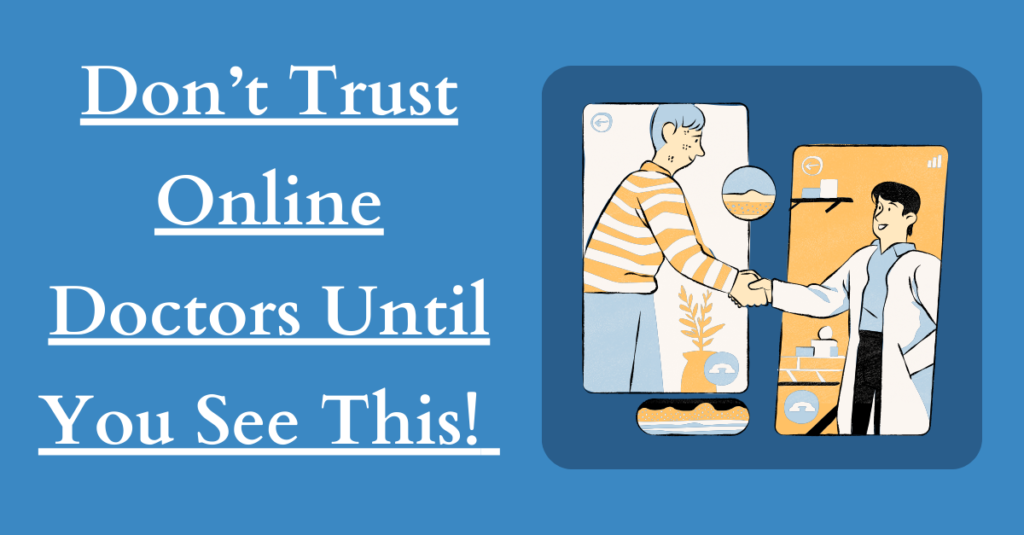Don’t Trust Online Doctors Until You See This!
Introduction
In this digital age, where the internet has revolutionized nearly every aspect of our lives, healthcare is no exception. Online doctor consultations have emerged as a convenient and accessible way to seek medical advice, providing a lifeline to those with limited access to traditional healthcare services. However, the explosive growth of this telemedicine trend raises a pressing question: can we truly trust online doctors with our health?
In “Don’t Trust Online Doctors Until You See This!” we delve into the world of virtual healthcare to uncover both its promises and pitfalls. With countless stories of misdiagnoses, privacy breaches, and questionable practices circulating, it’s essential to critically examine the reliability of online doctor consultations. We’ll explore regulatory frameworks and essential tips to help you navigate this evolving landscape. So, before you put your health in the hands of an online physician, join us on this eye-opening journey to discover the truth behind the screen.
-
The Rise of Telemedicine
The concept of telemedicine, or remote medical consultations, isn’t entirely new. It has its roots in early attempts at transmitting medical information over long distances, such as through telegraph lines. However, the internet’s proliferation has brought telemedicine into the mainstream, allowing patients to connect with healthcare professionals without leaving their homes.
The allure of telemedicine is undeniable. Patients can schedule appointments at their convenience, avoiding long waiting room hours and travel. This ease of access is particularly valuable for individuals living in remote areas or those with mobility issues. Moreover, telemedicine platforms often provide access to a broader pool of specialists, breaking down geographical barriers to quality healthcare.
-
The Advantages of Online Doctor Consultation

Before we delve into the reliability concerns, let’s first examine why online doctor consultations have gained such popularity.
- Convenience and Accessibility: Perhaps the most significant advantage of online doctor consultations is their unparalleled convenience. Patients can seek medical advice from the comfort of their homes, reducing the need to take time off work or arrange for transportation to a clinic. This is a game-changer, especially for individuals with busy schedules.
- Reduced Waiting Times: Traditional healthcare settings often involve long wait times for appointments. In contrast, online consultations can offer quicker access to healthcare providers, reducing the time spent in anticipation of a doctor’s visit.
- Lower Cost: Online doctor consultations can be more cost-effective. Without the overhead costs associated with maintaining a physical clinic, healthcare providers can often offer their services at a lower price. This can make healthcare more accessible to those without comprehensive insurance coverage.
- Access to a Wider Range of Specialists: Telemedicine platforms can connect patients with specialists from across the country or even the globe. This means that individuals with rare or complex medical conditions can access expert advice without the need for extensive travel.
-
The Potential Concerns with Online Doctor Consultation

While the advantages of online doctor consultations are compelling, they are not without their concerns and limitations.
- Limited Physical Examination: One of the most significant drawbacks of online consultations is the absence of a physical examination. In traditional healthcare settings, doctors can use various diagnostic tools and techniques to assess a patient’s condition. In contrast, online consultations rely primarily on verbal descriptions and, in some cases, images or videos provided by the patient. This limitation can lead to misdiagnoses or overlooked health issues.
- Privacy and Data Security: The exchange of personal and medical information over the internet raises valid privacy concerns. Data breaches and cyberattacks can compromise patient confidentiality, putting sensitive health information at risk. Ensuring the security of online platforms is paramount to maintain patient trust.
- Misdiagnosis and Improper Treatment: While many online doctors are highly qualified, misdiagnoses and inappropriate treatment plans can occur due to the limitations of remote consultations. The absence of physical examinations, lab tests, or in-person assessments can hinder accurate diagnosis and treatment.
- Lack of a Personal Touch: Building a doctor-patient relationship is essential for effective healthcare. Online consultations may lack the personal touch and bedside manner of traditional healthcare, potentially leading to reduced patient satisfaction and engagement.
-
The Role of Regulation and Technology
To address these concerns and ensure the reliability of online doctor consultations, several factors come into play:
- Government Regulations and Standards: Government bodies and healthcare authorities have a vital role in regulating telemedicine practices. Establishing clear guidelines and standards for online consultations can help ensure that healthcare providers maintain a high level of quality and accountability.
- Advances in Telemedicine Technology: The ongoing development of telemedicine technology is critical. Improvements in video conferencing, diagnostic tools, and secure data transmission can enhance the effectiveness and reliability of online consultations.
- The Importance of Secure Platforms: Online doctor consultation platforms must prioritize data security and patient privacy. Encryption, secure storage, and stringent access controls are essential components of trustworthy telemedicine platforms.
- Licensing and Credentials: Patients should be able to verify the credentials and licensing of online healthcare providers easily. Transparency in provider qualifications is essential for building trust in telemedicine.
-
Tips for Ensuring a Reliable Online Doctor Consultation
To make the most of online doctor consultations and mitigate potential risks, consider the following tips:
- Research the Platform and Healthcare Provider: Before scheduling an online consultation, thoroughly research the telemedicine platform and the healthcare provider. Look for reviews, check qualifications, and verify their licensing.
- Prepare for the Consultation: Write down your symptoms, questions, and concerns in advance. Ensure you have access to any relevant medical records or test results.
- Ask the Right Questions: During the consultation, don’t hesitate to ask questions about your condition, diagnosis, and treatment options. Seek clarification if something is unclear.
- Follow Up on the Consultation: Online consultations should not be a one-time event. Ensure you have a plan for follow-up appointments and communication with your healthcare provider as needed.
-
Ethical Considerations in Online Doctor Consultation
In the realm of online doctor consultations, ethical considerations are paramount:
- Informed Consent and Patient Autonomy: Patients must provide informed consent for any medical procedure or treatment. In online consultations, it’s crucial that patients understand the limitations and potential risks of remote care and have the autonomy to make informed decisions about their healthcare.
- Maintaining Patient-Doctor Confidentiality: Healthcare providers must uphold the highest standards of patient-doctor confidentiality, whether the consultation is in-person or online. Secure data transmission and storage are essential to protect patient privacy.
- Ensuring Equitable Access: Telemedicine has the potential to bridge healthcare disparities, but efforts must be made to ensure that underserved communities have equitable access to online healthcare services.
Conclusion (Don’t Trust Online Doctors Until You See This!)
Online doctor consultations have undoubtedly reshaped the healthcare landscape, offering unmatched convenience and accessibility. However, their reliability is a multifaceted issue that hinges on factors such as regulation, technology, and the diligence of healthcare providers and patients alike.
As we navigate this evolving landscape, it’s essential to strike a balance between the advantages and concerns of online doctor consultations. With proper research, responsible use, and a commitment to upholding ethical standards, online healthcare can be a valuable complement to traditional medical services. The key lies in informed decision-making and ensuring that the trust we place in online doctors is well-founded and well-deserved.

My name is Rohit Vagh and I’m a content writer specializing in fashion and lifestyle. I have three years of experience in this field and have written various articles. My writing style is creative and engaging, and I strive to create content that resonates with my readers. I have a deep passion for fashion and am constantly researching the latest trends and styles to make sure my readers are up to date. I’m excited to continue my career in blogging, and I’m always looking for new opportunities in the fashion and lifestyle space.





